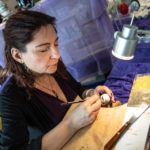 The community of “microentrepreneurs” in the world is much larger than the name suggests. In sub-Saharan Africa and South Asia, over 70% of those who earn their livelihood are self-employed, mostly as microentrepreneurs who hire fewer than five employees. According to some estimates, more than half of the world’s poor people make their living by selling goods and services in this manner.
The community of “microentrepreneurs” in the world is much larger than the name suggests. In sub-Saharan Africa and South Asia, over 70% of those who earn their livelihood are self-employed, mostly as microentrepreneurs who hire fewer than five employees. According to some estimates, more than half of the world’s poor people make their living by selling goods and services in this manner.
These businesses operate informally and are unstable, which has significant political implications. In 2010, the Arab world experienced upheaval after a poor Tunisian fruit and vegetable seller set himself on fire to protest against the country’s then-government.
Despite the widespread use of marketing by these millions of people, their marketing practices have not been extensively studied. Instead, marketing research has focused mainly on developed countries with advanced economies.
The role property plays
Research from Cambridge Judge Business School attempts to better explore the link between marketing innovation and property rights among microenterprises.
According to the study, individuals who lease their business premises and therefore have a degree of property stability are significantly more inclined to introduce innovative marketing practices in critical areas such as product, price, and promotion compared to those who merely “possess” or “dwell” on their property and have minimal or no property rights.
These marketing innovations, which are aimed at distinguishing businesses from their competitors and boosting profits, may involve tactics such as dividing a large package of products, strategically reducing prices, and creating in-store displays to attract more customers.
“The risk of expropriation linked to possession results in less marketing practice innovation and poorer performance,” the researchers explain.
The study examines the urban slum of Ezbet Khairallah in Cairo, which was constructed in the 1970s on two square kilometers of land and is home to 650,000 people, mostly migrants from Upper Egypt and the Delta region. The study’s sample comprises mostly women (60%) and those who have not completed primary school (52%). The researchers utilize a change in property-rights laws in Egypt to determine whether a microentrepreneur in the slum is a lessor or has other types of property rights.
In conclusion, the study suggests that governments in developing countries could offer innovative leasing programs as a way to address deeper issues surrounding formal property rights. Microentrepreneurs not only run small businesses but also participate in supply chains for larger companies, so improving the productivity and profits of microentrepreneurs can have positive impacts throughout the economy.